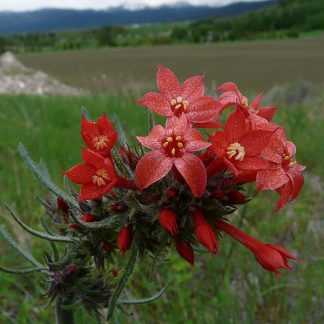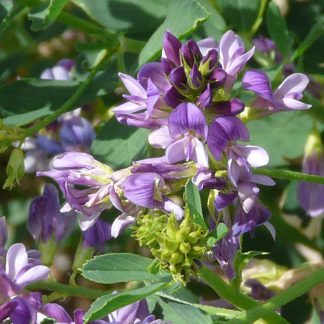variable - elongated axis
Showing 1–12 of 24 results
-

Aconitum columbianum / monkshood
- brilliant blue/purple - ish; mixed colors or white
- petal-like sepals form the hood
- palmate, deeply-lobed & toothed leaves
-

Agastache urticifolia / western horsemint
- short or tall flower heads ranging from pale to deep purple
- square stems, opposite leaves
- minty aroma
- common along trails, especially in sun
-

Amaranthus retroflexus / pigweed
- green bottle-brush inflorescence
- accomplished weed on disturbed sites (including road & driveway cracks)
- often in gardens, farm fields (edges), roadsides
-

Anticlea elegans / mountain death camas
- cream to greenish-white flowers; overall hexagonal appearance
- branched flowering stem with multiple flowers not tightly packed
- 6 tepals (petals + sepals), greenish-yellow nectar glands
- grass/lily-like leaves
- blooms in summer (July/August)
-

Artemisia ludoviciana / white sage
- low, spreading perennial - up to 3 feet tall
- silvery leaves and stems (hairy)
- leaves lance shaped, but sometimes lobed
- shoots die back in winter
- aromatic
-

Astragalus miser / timber milkvetch
- compound leaves with small, egg-shaped leaflets
- teeny, pea-like flowers - bicolored but overall blue/purple
- keel tip is purple and pointed
- small, hairy seed pods
- grassland, meadows, and other open communities
-

Castilleja spp. / paintbrushes
- vibrant, red (or yellow) inflorescence (bracts)
- widespread, but confusing... five or more species in the area
-

Corallorhiza wisteriana / spring coralroot
- small, easily missed in the forest duff
- no leaves, no green parts
- flowers have white lips, possible spots, no eared tabs
- scape (flowering stalk) purple, or yellow, or brown
- may stay dormant for years at a time
-

Dactylis glomerata / orchardgrass
- perennial bunchgrass
- branched inflorescence with lowest branch well below the others
- spikelets wedge-shaped, flattened in tight clusters
- florets green to red/purple tinged; grey-brown when seeds mature
- introduced and widespread, but not in wet areas
-

Geum triflorum / prairie smoke
- among the earliest bloomers in the spring
- clusters of nodding reddish, pink, maroon or purple flowers
- flowers in groups of 3
- distinctive fruit - like silvery-pink or mauve "troll dolls"
- in large populations, fruiting plants look (sort of) like smoke
-

Ipomopsis aggregata / scarlet gilia
- bright red (usually), elongated, trumpet-like flowers; 5 petals
- late season (July, August) flowers may be white
- highly divided, comb-like leaves
- pollination by hummingbirds (red forms) and moths (white, late forms)
- smells bad but tastes good
-

Medicago sativa / alfalfa
- escaped forage plant
- bright purple flowers in dense clusters
- pea-like flowers with broad upper petal, 2 small laterals, keel
- compound leaves with 3 leaflets, the central one extended on a short stalk
- disturbed sites - roadsides, full sun
Showing 1–12 of 24 results